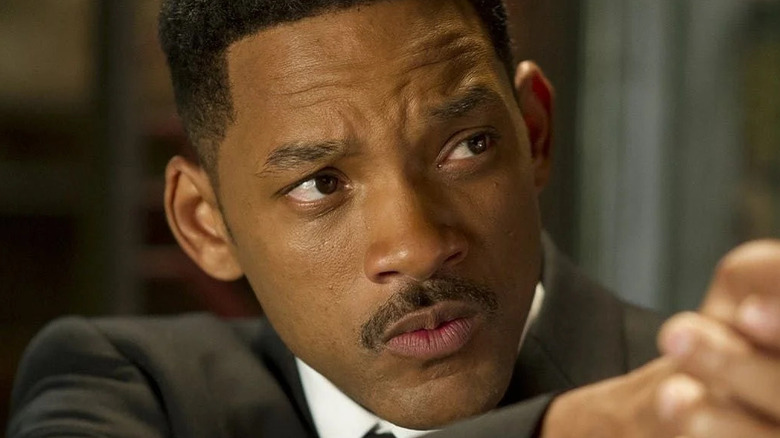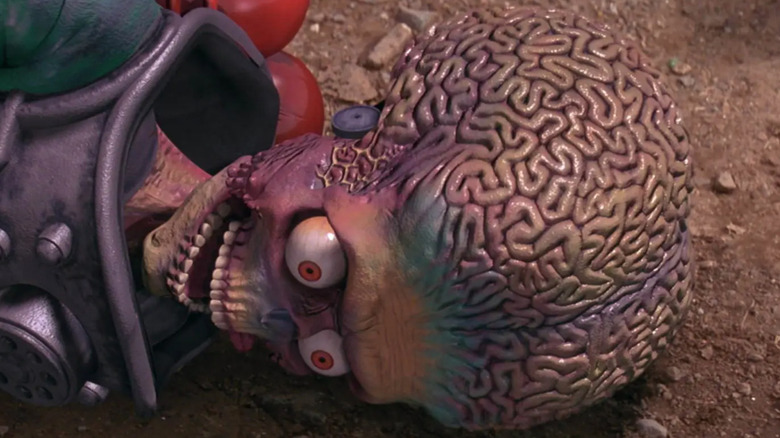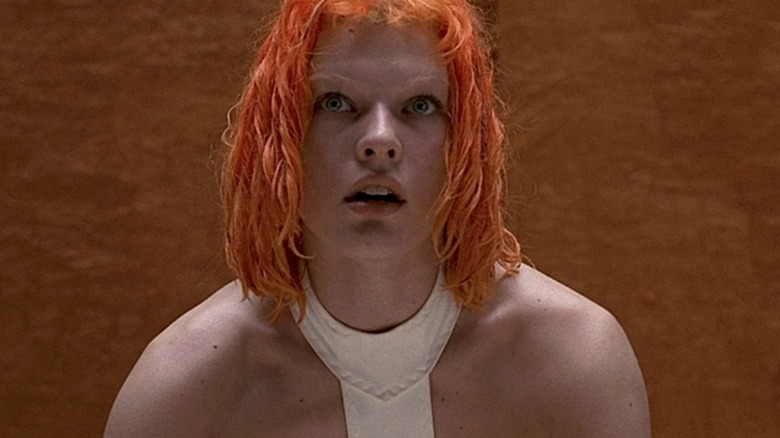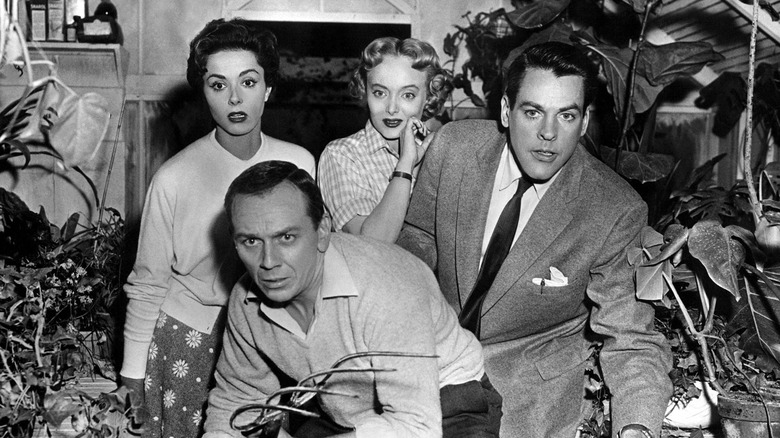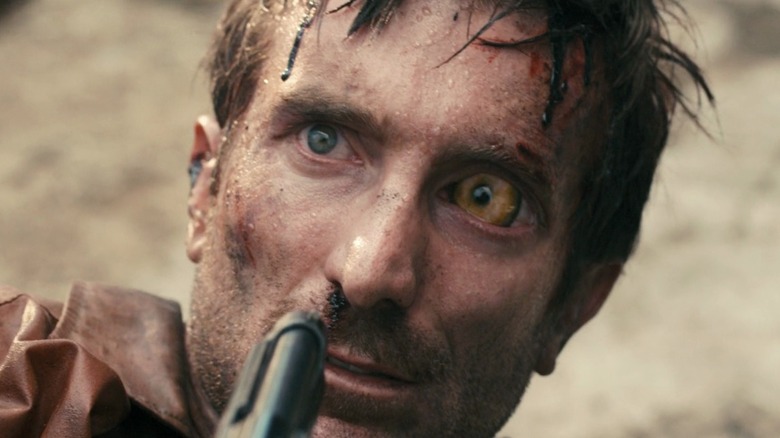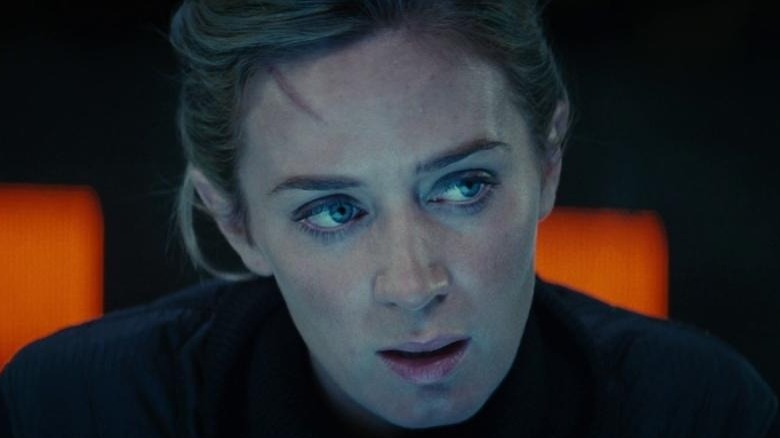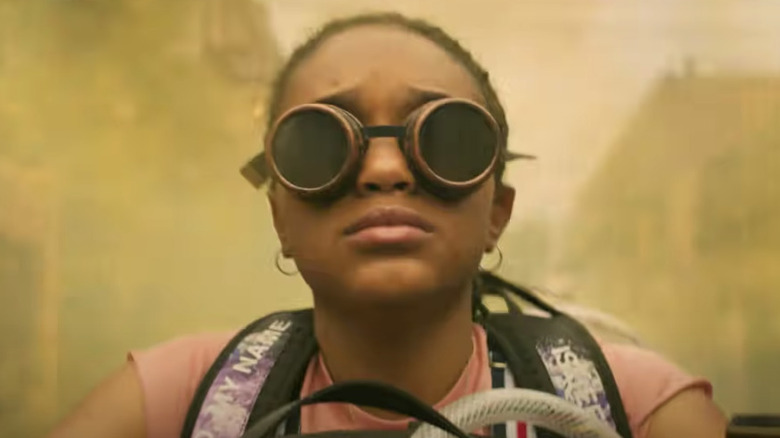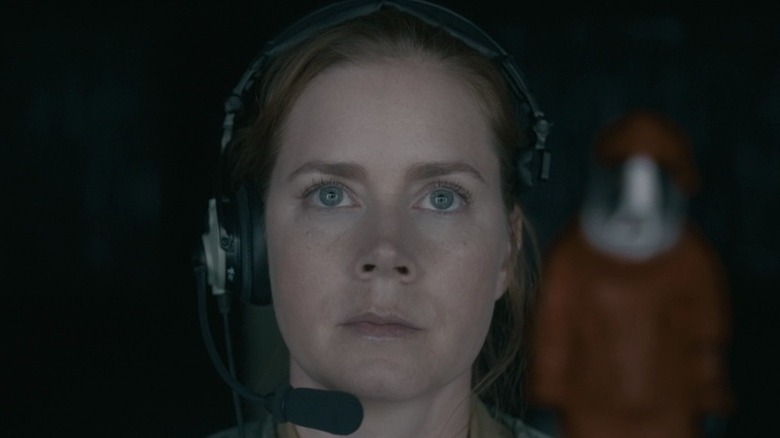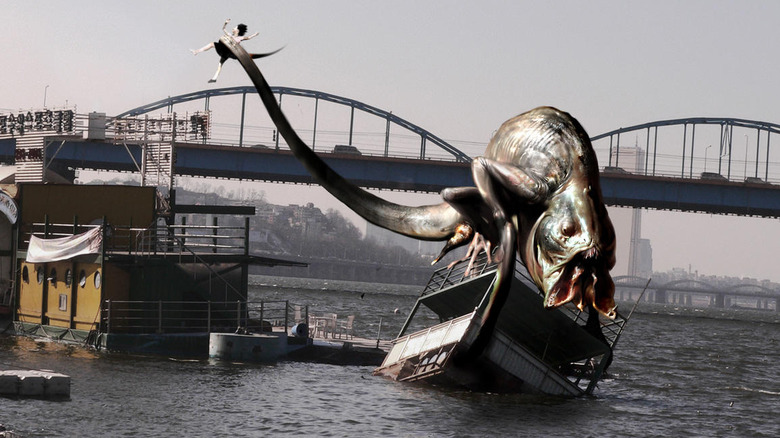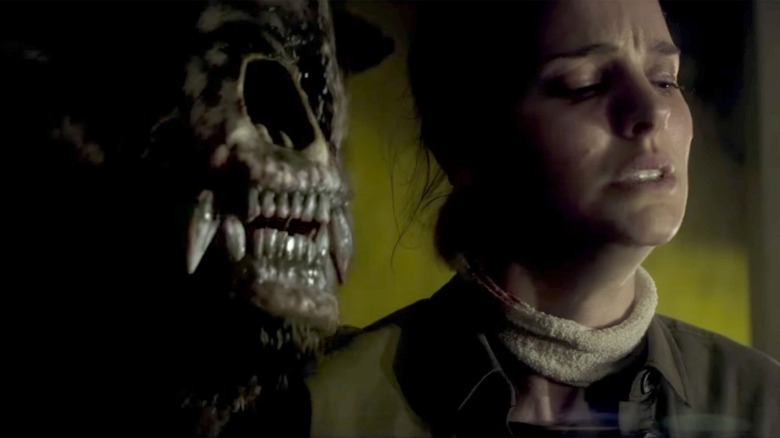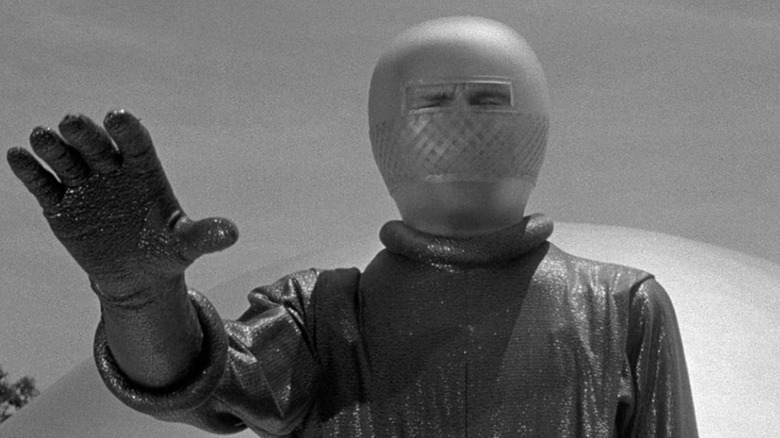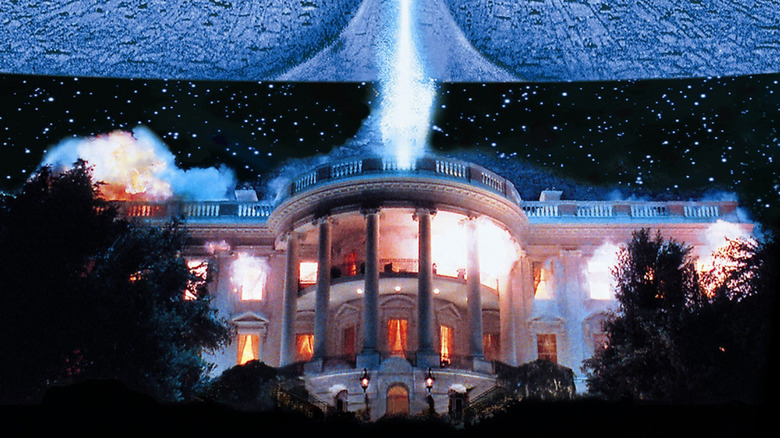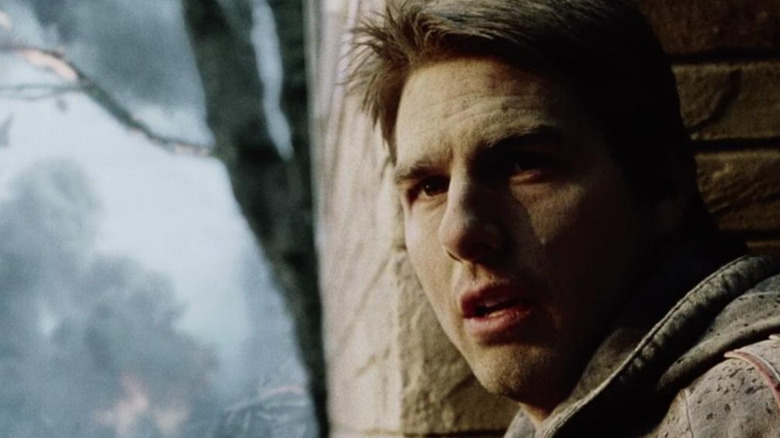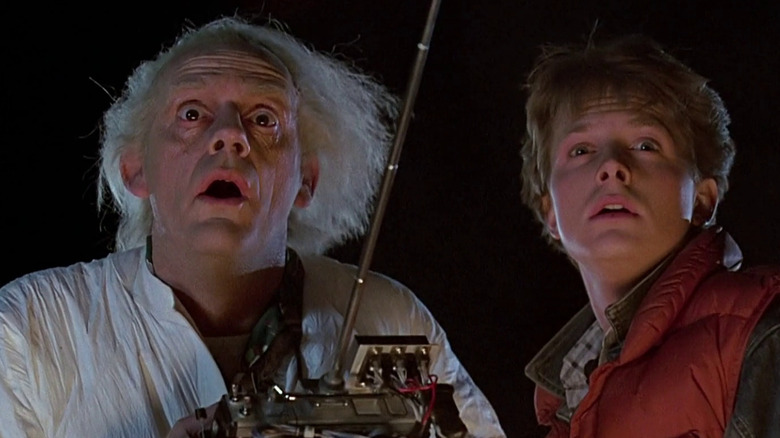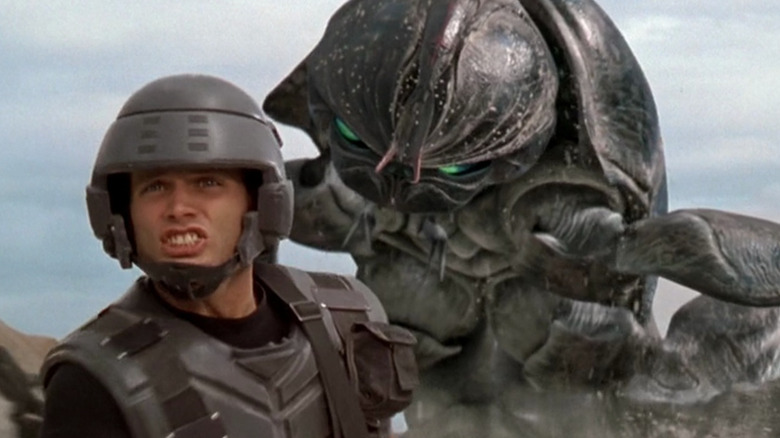Movies Like Men In Black That Sci-Fi Fans Need To Watch
The 1997 hit, "Men in Black," (aka "MIB") stars Will Smith and Tommy Lee Jones as agents of the top secret title organization, which oversees extraterrestrial life forms living on Earth and makes sure their presence stays hidden from ordinary humans. Tommy Lee Jones is Agent K, a weathered MIB agent who takes on a new partner, Agent J (Will Smith), who loves breaking rules, thinking outside the box, and generally being cool. When the two of them uncover a plot to start an interplanetary war, they decide to stop it from happening and make sure that humanity is none the wiser.
"Addams Family" helmer Barry Sonnenfeld directed this first installment of the MIB franchise and Steven Spielberg produced, so "Men in Black" made a splash with its visual effects, set pieces and comedic bits. After all, who could forget Frank, the talking pug? The film was a hit as Will Smith and Tommy Lee Jones proved to be the odd couple that no one knew they needed. "Men in Black" has become a sci-fi favorite, as it has all the elements audiences love: aliens, mutant creatures, and worldwide conspiracies all wrapped up in a fun and funny sci-fi buddy flick. If you love any or all of these things, check out these other sci-fi films that will be sure to hit that "Men in Black" spot (although we can't guarantee any of them will have as catchy a theme song as the MIB).
Mars Attacks!
"Mars Attacks!" is a Tim Burton movie that combines several qualities of "Men in Black": (inter)stellar cast, comedy, and sci-fi action. The film stars Jack Nicholson, Pierce Brosnan, Glenn Close, Natalie Portman and other A-listers as a group of Americans trying to survive attacks from Mars. Martians come to Earth claiming they come in peace, but either they're lying or they have a different definition of "peace" as they start systematically invading the planet and killing everyone.
"Mars Attacks!" is a spoof of the classic alien invasion flicks of the 1950s and draws on the tropes of those movies: an American president tries to control the situation; aliens disguise themselves as humans; Martians attack the White House and other iconic landmarks. If you're looking for an alien flick with that special Tim Burton twist or really just want to see Jack Nicholson interacting with a Martian in a fabulous purple robe, look no further than "Mars Attacks!"
The Fifth Element
"The Fifth Element" has become a cult favorite — if not an outright classic — since its 1997 release. Directed and co-written by Luc Besson ("Leon: The Professional"), this English-language French film follows Korben Dallas (Bruce Willis), a seen-it-all 23rd-century cab driver who suddenly becomes responsible for the fate of the world after a chance encounter with Leeloo, a mysterious humanoid woman played by Milla Jovovich. Similarly to "Men in Black," "The Fifth Element" makes use of humor in wild situations: Bruce Willis plays the typical deadpan and reluctant "Straight Man," trying to stay sane and calm in this chaotic world of aliens and wacky characters, which includes Chris Tucker's Ruby Rhod and Gary Oldman's evil Zorg.
Luc Besson came up with the story for "The Fifth Element" as a teenager and by the time of its release, he'd made a name for himself as one of Europe's top directors with highly stylized films such as "Leon: The Professional" and "La Femme Nikita." The tackling of a fundamental existential question — is humanity worth saving? — combined with its excellent cast sets "The Fifth Element" apart as a sci-fi film that can be revisited over and over again.
Invasion of the Body Snatchers
The 1950s marked a peak of alien invasion and creature feature films in the US; not coincidentally, the rise of these films coincided with the beginning of the Cold War and anxieties around the Russians and Communism taking over after World War II. Don Siegel's 1956 sci-fi horror classic, "Invasion of the Body Snatchers," focuses on a town in California where alien spores have fallen from space. The spores grow into pods, which produce alien copies of humans, who lack any emotion. It's up to Dr. Bennell (Kevin McCarthy) to uncover the truth of these "pod people" and save humanity from being replaced by these emotionless carbon copies.
Like "Men in Black," the film relies on aliens disguising themselves as seemingly recognizable beings and whether done comically or not, this manipulation and violation of human bodies can speak to a fear of the erasure of individualism and autonomy. For this reason, "Invasion of the Body Snatchers" has been read by many as an allegory for either the dangers of McCarthyism or Communism, both of which were seen as means of turning folks into "pod people." The film has become a classic, both in and outside of the genre, as institutions like AFI have recognized it as one of the greatest sci-fi films of all time.
District 9
Neill Blomkamp's feature film debut brings audiences into "District 9," an internment camp in Johannesburg, South Africa. In 1982, an alien spaceship suddenly appears over Johannesburg. The ship is filled with sick insectoid aliens, who are sent to District 9, where they're forced to live in squalid conditions. Tensions rise as humans resent the presence of the aliens and 20 years after their arrival, the aliens are forced to relocate to a new camp. The film follows Wikus van der Merwe (Sharlto Copley), a bureaucrat sent to District 9 to deal with this relocation. He starts turning into an alien after an accident and becomes embroiled in the life of Christopher Johnson, an alien who's trying to get back home.
Based on Blomkamp's short film, "Alive in Joburg," as well as on the history of apartheid in South Africa, "District 9" tackles themes of xenophobia, racism, and identity under the guise of sci-fi and action. The aliens are derisively called "prawns" and are seen as "leeching" off humans, which could situate the film in any number of places or with any number of communities in the real world. "District 9" was a critical success — it currently holds a 90% rating on Rotten Tomatoes — and was nominated for several Academy Awards, including Best Picture. Although it's a bit more serious than "Men in Black," the film will work for anyone looking for an exciting sci-fi action flick that stands out in the genre.
Edge of Tomorrow
Doug Liman's 2014 film "Edge of Tomorrow" brings Tom Cruise into familiar territory of having to save the world (again). Cruise plays William Cage, a military PR man with hardly any combat experience, who's sent to lead a mission to fight aliens that have invaded the earth. Cage gets exposed to alien blood, which puts him on a time loop where he gets killed and the day resets to 24 hours in the past. He meets Rita (Emily Blunt), a bad-ass war hero, and together, they try to fight the aliens by using Cage's time-looping ability. Rita trains Cage before his daily death, and as he gets closer to defeating the aliens, he gets closer to her as well.
"Edge of Tomorrow" follows the "Men in Black" formula of bringing two opposite people together. Cage is a man who's in over his head, while Rita is a take-charge leader with laser focus on the mission. Their dynamic calls to mind the relationship between fun-loving Will Smith and serious Tommy Lee Jones in "MIB" (although Cruise and Blunt have slightly more sexual tension). Doug Liman made a name for himself with '90s classics like "Swingers" and "Go" before moving on to the action world, where he directed "The Bourne Identity" and "Mr. & Mrs. Smith." The fun and humor of his earlier films make "Edge of Tomorrow" stand out, as does Emily Blunt's portrayal of a strong female protagonist in a genre that's often relegated to men.
See You Yesterday
Director Stefon Bristol brings reality into fantasy with his 2019 debut, "See You Yesterday." The film, produced by Spike Lee, follows CJ (Eden Duncan-Smith), a teenage science prodigy, and her best friend, Sebastian (Dante Crichlow), who are experimenting with time travel. When CJ's older brother, Calvin (Astro), gets murdered by the police — who mistake his phone for a weapon — she and Sebastian decide to go back in time to save her brother's life. She just has to make sure not to affect the future too much with whatever she does in the past.
Like some of the best and most powerful sci-fi, "See You Yesterday" looks at the present through a lens of the future. It uses the freedom of sci-fi to explore real, emotional issues such as racism and police brutality, as CJ has to deal with the grief of her brother's senseless death and the system that allowed and caused it. "See You Yesterday" is unique with its blending of genres in it's a socially relevant sci-fi film starring a female protagonist of color, so anyone looking for something fresh and exciting can jump into the time loop with CJ.
Arrival
Denis Villeneuve directed "Arrival," which was adapted from Ted Chiang's short story, "Story of Your Life." The film focuses on linguist Louise Banks (Amy Adams), who is tasked with communicating with aliens on board one of 12 ships that have suddenly appeared all over Earth. Louise works with physicist Ian Donnelly (Jeremy Renner) to learn about the aliens and try to communicate with them. But as Louise focuses all of her energy on communicating with these aliens and finding out what they want, she begins to experience memories that she doesn't understand and didn't know she had.
The question of how humans would interact with aliens, as well as what extraterrestrial life forms would want from us, is one of the oldest in the genre. "Arrival" answers this in a new way as the film focuses on the question of communication itself and how language can shape perception. Villeneuve brings the intensity from previous films like "Prisoners" and "Sicario" to a quieter place as the film follows Louise's journey of exploration and discovery, while Amy Adams' depiction of this brilliant linguist has turned Louise into a standard-bearer for female protagonists in sci-fi. Although "Arrival" is more of a drama, with much less action or comedy than "Men in Black," it can still be appreciated by anyone who loves movies about aliens or just movies at all.
The Host
Director Bong Joon-Ho's South Korean creature feature, "The Host," is as much about a mutant monster living in Seoul's Han River as it is about a dysfunctional family dealing with its own monsters within. An American military base dumps formaldehyde into the Han River, which leads to the creation of a giant monster. The monster emerges from the river one day and starts snatching up people to eat, including the daughter of Park Gang-du (Song Kang-ho). Park Gang-du is a clumsy, lazy snack bar owner, who enlists the help of his family to track down this creature and find his daughter.
"The Host" is one of several collaborations between Bong Joon-Ho and Song Kang-ho, who would later work together on the critically-acclaimed, Oscar-winning "Parasite." "The Host" transforms a seemingly straightforward genre — the creature feature — into a hybrid of horror and melodrama. Is the monster the mutated river creature or in the family itself? "The Host" takes a comedic approach to dealing with something fantastic and terrifying, so if you're looking for something as fun and exciting as "Men in Black," dive into "The Host."
Annihilation
Writer-director Alex Garland brings his trademark visual style and sci-fi experience to "Annihilation," an adaptation of Jeff VanderMeer's book of the same name. Natalie Portman plays Lena, a biologist who joins an expedition to explore the Shimmer, a mysterious area that was formed after a meteorite hit Earth. Lena's husband (Oscar Isaac) had gone on a previous expedition to the Shimmer and suddenly died not long after his return home. Searching for answers and a way out of her grief, Lena joins four other women on this mission into the Shimmer, where they soon discover that nothing is as it seems.
Alex Garland made a name for himself in horror and sci-fi by writing films such as "28 Days Later," "Sunshine," and "Ex Machina," which he also directed. Like these other films, "Annihilation" marries high visual style with elevated storytelling as the film follows Lena and her companions into the unknown, literally and figuratively. The film is notable for its nearly all-female cast, as Natalie Portman is joined by Jennifer Jason Leigh, Gina Rodriguez, Tessa Thompson and Tuva Nuvotny on the expedition into the Shimmer. "Annihilation" uses exciting visual effects to create this alien world with strange creatures, much like "Men in Black," so follow the team into the Shimmer if you want to see an intense and stimulating sci-fi tale.
The Day the Earth Stood Still
Robert Wise's 1956 alien contact film, "The Day the Earth Stood Still," has become a sci-fi classic and a staple for anyone who loves (or fears) aliens. A UFO lands in Washington DC, and Klaatu (Michael Rennie), a humanoid, emerges from the spaceship with Gort (Lock Martin), a powerful and dangerous robot. Klaatu is here to give humans a message, but before he can do so, he's attacked by the military. Klaatu decides to spend some time with humans to understand them and their need for violence before delivering the message. He's taken in by a family who show him what it means to be human, but will that be enough to save Earth?
While "The Day the Earth Stood Still" is a product of its time as it speaks directly to the anxiety of the nuclear arms race, its questions of what it means to be human and why we act the way we do remain relevant today. Director Robert Wise, later known for classic musicals like "West Side Story" and "The Sound of Music," promotes peace and unity with the film's message that if you keep threatening nuclear war, you will be destroyed by seven-foot-tall robots. Audiences heard it loud and clear and "The Day the Earth Stood Still" has been a beloved classic for decades now.
Independence Day
The year before "Men in Black" was released, Will Smith led a different alien flick with his role in Roland Emmerich's "Independence Day." Massive UFOs land above 15 major cities around the world and in a coordinated attack, decimate the cities and kill millions. Captain Steven Hiller (Smith) becomes part of a mission to launch a counterattack on Independence Day and show these aliens what humans (and specifically, Americans) are made of. He joins forces with a group of others, including Jeff Goldblum and Randy Quaid, to take down the aliens and save humanity from the threat.
In typical Roland Emmerich fashion, "Independence Day" is chock full of action and destruction on a massive scale (the man loves a disaster). The film pulls from all the standard narrative beats of an alien invasion film, only on steroids. "Independence Day" was a smash hit as it became the highest-grossing film of 1996 and went on to gross $817 million worldwide. Fans of Will Smith, special effects, and the battle to end all battles between humans and aliens will love this '90s classic.
War of the Worlds
Steven Spielberg's 2005 feature, "War of the Worlds," brings one of the most (in)famous sci-fi books to the big screen for the second time, following the 1953 film produced by George Pal. H.G. Wells' 1898 novel of the same name is about a Martian invasion of Earth as told through the eyes of an unnamed narrator. Orson Welles dramatized the book for a radio program in 1938, acting out fictional news bulletins about the Martian invasion, which sounded so real that they caused a minor panic as some people actually thought aliens had invaded Earth.
Steven Spielberg takes "War of the Worlds" to a different place. Tom Cruise stars as Ray Ferrier and Dakota Fanning as his daughter, Rachel. Ray is divorced and lives separately from his kids, but when aliens invade and attack the earth, he does everything in his power to save his family. "War of the Worlds" is Cruise and Spielberg's second sci-fi collaboration after "Minority Report" and shows that sci-fi is a genre in which they both thrive. While Wells' original book was seen as a commentary on British imperialism, Spielberg has noted how 9/11 influenced his telling of this story about the fear of the "other," which descended upon the American psyche suddenly and created a mob-like mentality.
Back to the Future
Robert Zemeckis' "Back to the Future" is one of the most beloved and influential sci-fi films ever made. There are no aliens here but the film's use of humor and an odd couple friendship can clearly be seen later in "Men in Black." It's 1985 and teenager Marty McFly (Michael J. Fox) accidentally goes back to 1955 via a time-traveling DeLorean rigged up by his wacky friend, Doc Brown (Christopher Lloyd). Marty meets his parents as teenagers and prevents them from dating, as his mysterious presence in the past (and excellent '80s style) shakes everything up. But if his parents don't fall for each other, then he'll never be born, so Marty has to get them together and get back to the future before it's too late.
While the storyline of "Back to the Future" gets uncomfortable (the younger version of Marty's mom falls in love with him when he travels to the past), it works thanks to the memorable cast and humor. It doesn't take itself so seriously, which was the reason Eric Stoltz, the original Marty McFly, was recast after filming began; he lacked the screwball comedy element. "Men in Black" takes a page from the book of "Back to the Future" as it leans into the humor of the genre; sure, aliens roaming the earth could be scary but also, it might be weird and fun too — just like this joyful romp through time.
Starship Troopers
Director Paul Verhoeven returned to sci-fi after several years away with 1997's "Starship Troopers," an adaptation of author Robert A. Heinlein's book of the same name (although the director himself admits he didn't read the book). The film stars Casper Van Dien as Johnny Rico, a young man in the 23rd century who enlists in the military as a way of getting access to basic human rights denied to civilians. While colonizing new planets, humans have discovered an alien race of arachnids, nicknamed "Bugs," which turn hostile when confronted with violent human aggression (go figure). Johnny embarks on a series of missions with his military unit as they combat the Bugs and try to destroy them (even though the humans are on this species' planet).
"Starship Troopers" was derided by critics at the time for being a film of mindless violence, but some have argued that critics missed the point of its satirical look at militarism, imperialism and a defensive mentality. The film has been revisited with a new perspective and even came in at #20 on Slant magazine's list of the 100 best films of the '90s. Verhoeven had wowed audiences with 1987's "Robocop," a darkly satiric look at identity, corporate greed and the militarization of the police, and brings that same darkness to this film thanks to a script by Edward Neumeier, who also wrote "Robocop." Fans of "Men in Black" will find that "Starship Troopers" also makes use of sci-fi action tropes to comment on the colonialism that so often is at the heart of human versus alien sci-fi stories.
